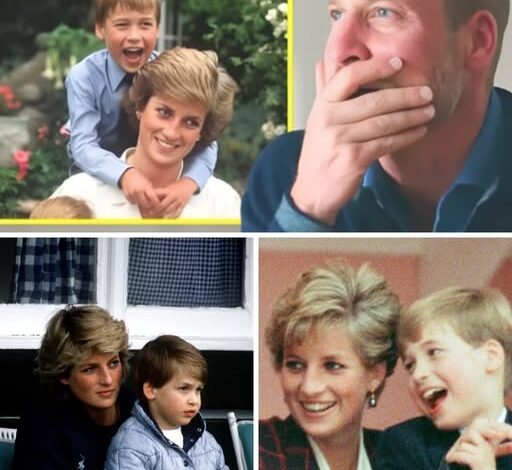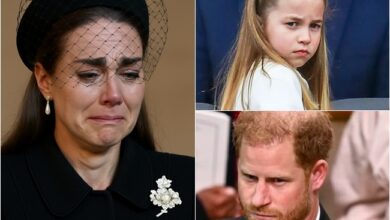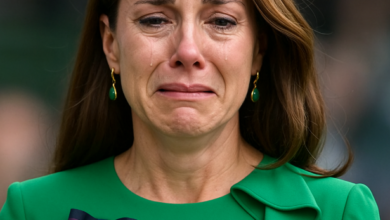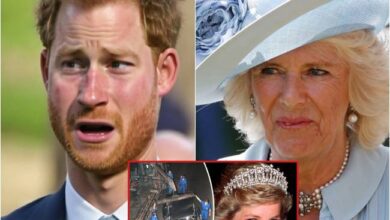“MUMMY, I MISS YOU”: Prince William Fights Back Tears in Silent Tribute to Princess Diana

“MUMMY, I MISS YOU” — Emotional William Fights Back Tears as He Pays Silent Tribute to Princess Diana During Latest Engagement During his latest public engagement, the normally composed Prince William was visibly moved when he paused mid-speech, his voice catching as he whispered, “Mummy, I miss you.” In the hush that followed, the weight of his grief filled the room — not just as a royal duty, but as a son honoring his mother, Princess Diana. Photographers captured a rare moment of vulnerability: William’s brow furrowed, his eyes shimmering, as he placed one hand over his heart. Insiders say the tribute was meant to be silent, apart from the few words, yet it spoke volumes about the legacy he carries and the love that still guides him. Witnesses described a sudden hush in the crowd — the pageantry faded and what remained was a human connection that transcended title or throne.
“MUMMY, I MISS YOU”: Prince William Fights Back Tears in Silent Tribute to Princess Diana
It was meant to be a routine royal engagement — a visit to a children’s mental health center in East London. But as Prince William stood before a mural of his late mother, Princess Diana, his composure faltered. The room fell silent as Britain’s future king blinked back tears, his expression betraying a wave of emotion he could no longer contain.
One onlooker recalled hearing him whisper, almost under his breath, “Mummy, I miss you.”
It was a moment of raw humanity — fleeting, tender, and deeply poignant.
A Son Remembering His Mother
For decades, Prince William has carried his mother’s legacy quietly, preferring action over words. But during Thursday’s engagement at the Hopewell Youth Centre — a program dedicated to supporting children dealing with trauma — the weight of her memory was impossible to ignore.
The mural, painted by local artists, depicted Princess Diana surrounded by children, her hands outstretched in a gesture of compassion that had defined her life. Below it, a quote read: “Carry out a random act of kindness, with no expectation of reward.”
When William approached the artwork, witnesses said his face softened. He clasped his hands together, bowed his head, and stood motionless for nearly thirty seconds.
“You could see it in his eyes,” said youth counselor Hannah Lee, who was present during the visit. “It wasn’t a prince standing there — it was a son remembering his mum.”
Breaking the Silence
After a few moments, William addressed the small audience gathered in the hall. His voice was steady at first, but tinged with emotion.
“My mother believed every child deserves to be seen, to be heard, to be loved,” he said. “That belief has shaped everything I do — as a father, as a husband, and as someone who’s still learning how to live up to her example.”
The crowd, a mix of volunteers and young people, responded with quiet applause. But William’s words carried more weight than applause could measure. For many, it was a rare glimpse of vulnerability from a man often defined by duty and composure.
Royal correspondent Emma Hayes later described it as “one of the most personal moments of his public life.”
“He’s spent years honoring Diana through his work,” Hayes wrote, “but this was different. This was grief in its purest form — still present, still tender, still love.”
A Life Shaped by Loss
Princess Diana died in a car crash in Paris on August 31, 1997, when William was just 15. The images of him and his younger brother, Harry, walking behind her coffin remain etched in Britain’s collective memory — symbols of heartbreak, resilience, and the unimaginable weight placed upon royal children.
Over the years, William has spoken cautiously about the loss. In interviews marking his mother’s 60th birthday in 2021, he said, “There’s not a day that goes by when I don’t think about her.”
This week’s moment, however, felt different — not rehearsed or expected, but instinctive.
“Grief doesn’t fade — it evolves,” said Dr. James Mellor, a psychologist who has advised the royal mental health initiative Heads Together. “For Prince William, his mother’s death is no longer just a private loss; it’s the emotional foundation of his empathy. You could see that in how he stood before that mural.”
The Echo of Her Voice
After the ceremony, William met privately with several children who had lost parents. One 10-year-old boy named Caleb, who lost his mother to cancer, shyly asked the prince, “Do you ever get sad about your mum?”
Witnesses say William knelt beside him and nodded.
“All the time,” he said gently. “But I try to do things that would make her proud. That helps me feel close to her again.”
Those words, simple and sincere, resonated far beyond the small room. Within hours, clips from the engagement flooded social media, drawing tears from viewers around the world. Hashtags like #ForDiana and #MummyIMissYou began trending across platforms.
“I’ve never seen William look more like his mother,” one user wrote. “You could feel the love in his eyes.”
Carrying Her Legacy Forward
Throughout his royal career, William has carried Diana’s torch in both quiet and public ways — through his advocacy for mental health, homelessness prevention, and children’s welfare.
At the event, he announced new funding for Hopewell’s Reach, a program providing grief counseling for young people who have lost parents. “We can’t take away the pain,” he said, “but we can make sure no child faces it alone.”
Royal insiders say the moment wasn’t planned to be emotional. “He didn’t expect the mural,” one aide shared. “When he saw her face, it hit him — the memories, the legacy, everything.”
Catherine, Princess of Wales, who has recently resumed limited public duties after her health recovery earlier this year, was reportedly “deeply moved” when shown footage of her husband’s reaction.
“She knows how much Diana still guides him,” said a palace source. “That’s part of what makes him the man — and father — he is.”
From Loss to Light
The poignancy of William’s tribute lies not only in what he said, but in what he didn’t. The silence, the lowered gaze, the single whispered word — Mummy — carried more emotion than any speech could convey.
“It reminded people that behind the crown and the cameras, he’s still her little boy,” said royal historian Patrick Ellison. “That bond doesn’t die. It just finds new ways to speak.”
Later that evening, Kensington Palace released a single photograph from the engagement: William standing before the mural, sunlight streaming through the windows, his reflection faintly overlapping Diana’s painted image. The caption read simply: “Always remembered.”
The photo broke records for royal engagement shares within hours.
A Nation Remembers Too
Across Britain, people laid flowers outside Kensington Palace once again — a gesture unseen since the late 1990s. Many were accompanied by handwritten notes: “She would be proud of you, William.”
One message, taped to the palace gates, read: “The boy who lost his mother is now the man who carries her heart.”
For those who grew up watching Diana’s kindness redefine royalty, seeing her son honor her so openly felt like healing, both personal and national.
As one London mother said while placing daisies by the gate: “When he said ‘Mummy, I miss you,’ every one of us who’s lost someone heard him. That’s what made Diana special — she made us all feel seen. And now he’s doing the same.”
In that moment, the line between past and present blurred — a mother’s love echoing through time, through her son, through every child who dares to feel deeply in a world that too often asks for composure.
And for a few quiet seconds in a crowded hall in East London, a future king remembered the woman who taught him what it means to be human.






